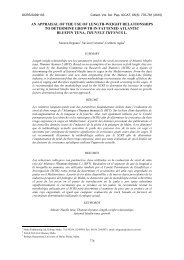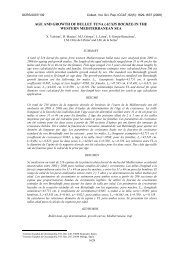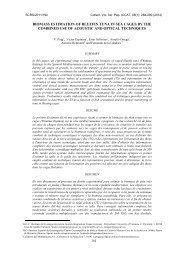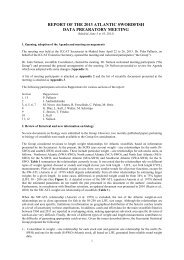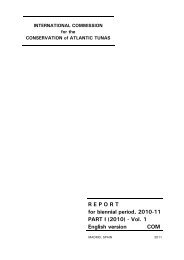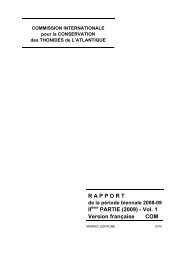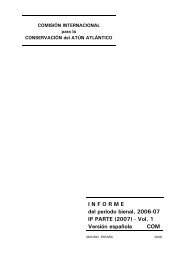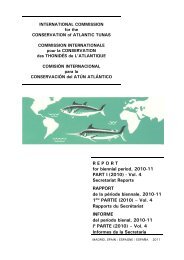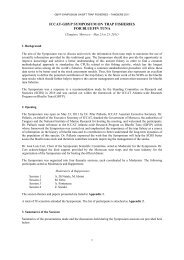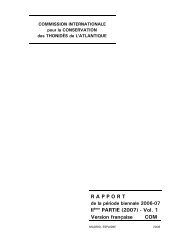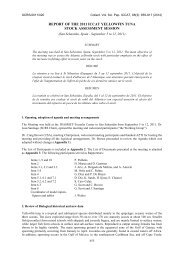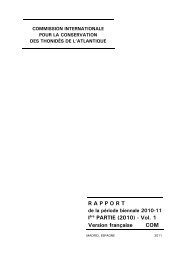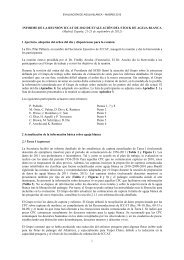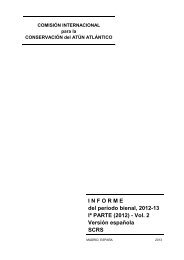E - Iccat
E - Iccat
E - Iccat
You also want an ePaper? Increase the reach of your titles
YUMPU automatically turns print PDFs into web optimized ePapers that Google loves.
OPENING ADDRESSES & STATEMENTS<br />
members that the conservation of these stocks come second to the needs of their respective industries, has led<br />
ICCAT to renege on its responsibility to conserve tuna and tuna-like species.<br />
In Bilbao, we made some noticeable strides forward. Management regimes for southern swordfish and eastern<br />
bluefin were re-established and a spirit of compromise and cooperation was rekindled. Nonetheless, we all left<br />
the 2002 commission meeting knowing that we are still fishing many stocks above sustainable levels, that we<br />
continue to take far too many small and juvenile fish, and that compliance with existing measures amongst<br />
ICCAT members is a growing concern.<br />
Also, last year the SCRS was unable to complete stock assessments for several major stocks because members<br />
had not supplied data, even though the provision of data is essential for the functioning of ICCAT.<br />
Unfortunately, the situation has not improved this year. As such, we must take measures this year to assure that<br />
this basic requirement is met by all members and cooperating parties. Canada believes that those not meeting this<br />
basic responsibility of ICCAT should be held to account.<br />
Canada believes that if we do not change our ways, ICCAT is living on borrowed time. We cannot expect to<br />
maintain our credibility as an effective regional fisheries management organization if we continue to tie the<br />
hands of our scientists with lack of data, ignore non-compliance by members, and fail to address fishing<br />
activities by all in a fair and transparent manner.<br />
On a more positive note, commitments from some to improve data collection and reduce the harvest of small fish<br />
were made. Canada would like to take this opportunity to congratulate those who have made this commitment.<br />
They have advised us that they will be delivering the goods. We will hold them to this.<br />
As the regional management fisheries organization responsible for the conservation of tunas and tuna-like<br />
species in the Atlantic, ICCAT must adopt and implement effective management measures that will ensure a<br />
sustainable fishery for future generations to enjoy.<br />
Are we providing “effective management”? In Canada’s view the answer to this question is not yet. Our rules are<br />
too often unclear and inconsistent with international norms, and are applied inconsistently and sometimes<br />
arbitrarily.<br />
Is there a conservation ethic within ICCAT? In Canada’s view the answer to this question is sadly no. Our<br />
scientists are unable to complete stock assessments, as members do not provide basic fisheries data. We continue<br />
to engage in unsustainable practices such as excessive harvests of juvenile fish and fishing above any reasonable<br />
calculation of maximum yield. Canada believes that the time to address these issues is now.<br />
At the Madeira inter-sessional meetings, Canada outlined what it referred to as the four “C”s that should guide<br />
ICCAT: conservation, clarity, consistency and compliance. Upon reflection, we would add a fifth “C”: cash, as<br />
ICCAT is an organization whose members habitually do not meet their financial obligations to the Commission.<br />
Again, Canada believes that those who do not contribute to the organization should not be considered full<br />
members of the organization.<br />
Without any of these Cs we risk eroding our credibility as an effective regional fisheries management<br />
organization. We all know and recognize the challenges ahead of us. Last year we made important strides to<br />
address them. We look forward to working closely this week with all ICCAT members to maintain this<br />
momentum. Let’s make the best of this opportunity.<br />
Côte d’Ivoire<br />
Côte d’Ivoire is honored to take part in the 18th Regular Meeting of the Commission. First of all, in my position<br />
as Minister of Animal Production and Fishery Resources and on behalf of the Government of Côte d’Ivoire I<br />
would like to thank the Chairman who has made it possible for the Commission to make considerable progress.<br />
Further, I would like to thank ICCAT, which provides my country with the opportunity to participate in this<br />
important meeting that is taking place in this beautiful city of Dublin.<br />
Côte d’Ivoire reaffirms the importance of the tuna resources and their contribution to the national GDP. It<br />
reaffirms as well the importance of the durable management of the fisheries for food security, the realization of<br />
the socio-economic objectives and the well being of the fishers and their families.<br />
57



